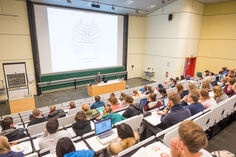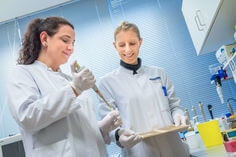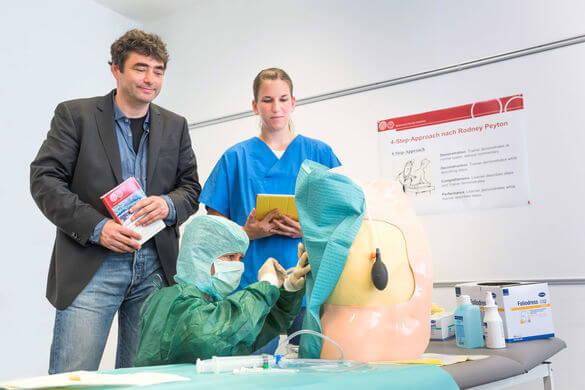Teaching concepts
In HeiCuMed, abstract memorisation is replaced by practical exercises in small groups. The future doctors acquire their knowledge based on the patient's symptoms instead of trying to transfer their factual knowledge to the patient. This means that the training comes much closer to the everyday life of a clinically active doctor, who deduces the underlying disease from the symptoms. The teaching throughout the programme consists of a mixture of classical and modern teaching methods.
Lectures, internships & seminars
Lectures on basic cardinal symptoms form the framework of the courses. The lectures are framed by seminars and supplemented by practical exercises. There, you will be divided into groups that you will remain in throughout the programme. This class-like division enables you to deal more intensively with a topic, practise independently and work together. An important teaching method in the seminars is problem-based learning (POL). Here, the basic principles of diagnostics and therapy are taught on the basis of case-studies with relation to the cardinal symptoms. This promotes clinical thinking.
The pre-clinical curriculum in particular is characterised by interdisciplinary teaching. In the integrated lectures, organs, symptoms or diseases are considered simultaneously from the perspective of several disciplines in order to gain a holistic impression.
Innovative forms of teaching in practice
Practical teaching takes place in the form of interdisciplinary seminars organised in thematic units. In the skills lab, students practise basic medical skills on themselves or on models, which are thematically related to the specialised courses. Patient consultations and anamnesis are practised with standardized patients.
In the pre-clinical phase, for example, you will encounter virtual patient cases, learn with tutors or complete internships in teaching hospitals. The clinical part of the programme includes examination courses, bedside teaching, communication training and other skills labs. Various e-learning modules support your learning process with videos, digital case collections or simulations.



![[Translate to English:] [Translate to English:]](/fileadmin/_processed_/9/b/csm_Firefly_Abstract_organic_flow_resembling_blood_vessels_shaped_as_a_tool__composed_of_glowing_651800_26778ea790.png)

